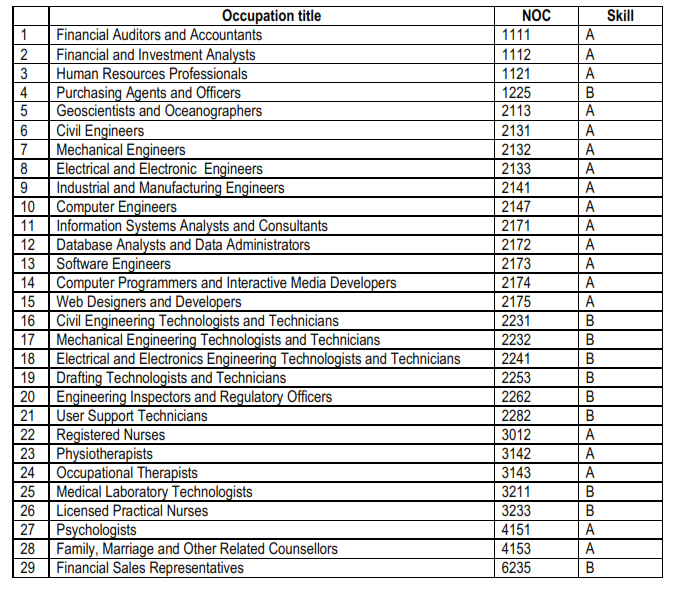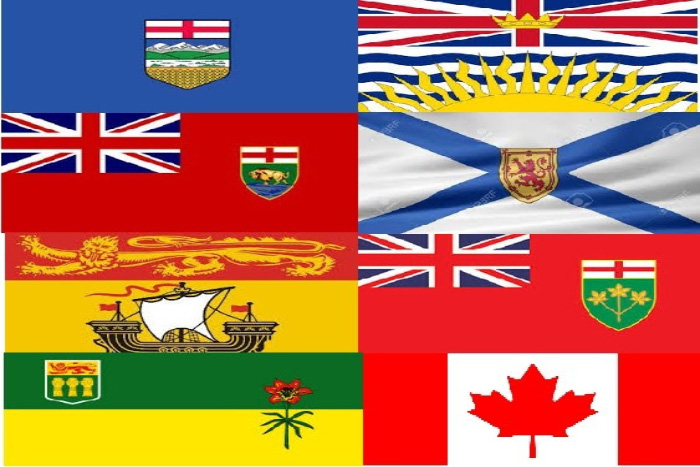This page is designated only for PNP program for Skilled and/or International graduate stream and does not require to have an offer of employment in the nominating province. If you are interested to seek information on PNP business program, please refer to tab "Entrepreneur (Business Class)"
 Alberta
Alberta -

Strategic Recruitment Stream
You do not need to have a job offer to apply under Strategic Recruitment Stream.
1. Compulsory and optional trades criteria
- You must intend to and be able to live and work permanently in Alberta.
- You must have a valid Alberta Qualification Certificate in a compulsory or optional trade OR a valid Alberta Apprenticeship and Industry Training Recognized Trade Certificate in a compulsory or optional trade.
- You must be residing in Alberta at the time of application and show that you have a valid ⦁ work permit from Citizenship and Immigration Canada (CIC) to work in Alberta in the trade in which you are certified.
- You must show, at the time of application, that you are either currently working in your trade for an Alberta Employer or have previously worked in your trade with an Alberta Employer for a minimum of six months in the past two years.
- If you are working in a NOC C (semi-skilled) level occupation, you are required to meet language requirements for semi-skilled occupations, which is score of 4.0 in IELTS exam.
2. Engineering Occupation criteria
- You must be currently residing in Alberta.
- You must intend to and be able to live permanently in Alberta.
- You must provide evidence of related education/training and experience as an engineer, designer or drafter.
- You must be currently working or have worked within the last two years in Alberta either directly or on contract for an Alberta Employer.
- Your occupation in Alberta must be on the ⦁ AINP Strategic Recruitment Stream Engineering Occupations List
Engineering Occupations List
NOC Code Description 0211 Engineering Managers 2131 Civil Engineers 2132 Mechanical Engineers 2133 Electrical and Electronics Engineers 2134 Chemical Engineers 2141 Industrial and Manufacturing Engineers 2143 Mining Engineers 2144 Geological Engineers 2145 Petroleum Engineers 2231 Civil Engineering Technologists & Technicians 2232 Mechanical Engineering Technologists & Technicians 2241 Electrical and Electronics Engineering Technologists and Technicians 2253 Drafting Technologists & Technicians 3. Post Graduate Worker Category.
- You are able to and intend to live permanently in Alberta.
- Be working full-time in Alberta, at the time of application, for an Alberta employer.
- Have obtained a certificate, diploma, degree, or have completed a graduate level program from one of the ⦁ AINP approved Alberta public and private post-secondary institutions.
- The program of study in Alberta must have been at least one year (i.e. minimum of two semesters of full-time study, or equivalent) in duration.
- Have a current and valid ⦁ Post-Graduation Work Permit issued by Citizenship and Immigration Canada.
- Be working in NOC level 0, A, B & C except in ineligible occupations.
- If working in a NOC C occupation, you must submit official test results showing that you meet the minimum language standards. CELPIP Score 4 in all four components, IELTS score: Listening 4.5, Reading 3.5, Writing & Speaking 4.0.
 British Columbia
British Columbia -
International Post Graduate Category
To apply to the PNP as a recent graduate of a master’s or doctoral program, you must have the following:
- A master’s or doctoral degree received within the past two yearsfrom an eligible program at a post-secondary institution in B.C.Your graduate degree (master’s or doctorate) must be in one of thefollowing programs of study in the natural, applied or health sciences:

- Agriculture
- Biological and biomedical sciences
- Computer and information sciences and support services
- Engineering
- Engineering technology
- Health professions and related clinical sciences
- Mathematics and statistics
- Natural resources conservation and research
- Physical sciences
- Evidence that you intend to reside in B.C. You must provide us with evidence that you intend to live and work in B.C. once you obtain your permanent resident status in Canada. This evidence may include:
- the length of any previous and/or current period of residence in B.C.,
- your connections to B.C. through work, study or family, and
- a description of any actions you’ve taken to settle in B.C., such as finding a job or place to live.
 Manitoba
Manitoba -
There are two pathways to Manitoba

Skilled Workers in Manitoba
Applications are accepted from qualified temporary foreign workers and international student graduates who are currently working in Manitoba and have been offered a permanent job with their Manitoba employer. Ongoing Manitoba employment means that a Manitoba company has offered you a long-term, full-time job after you have completed at least six months (continuous) full-time employment with that company as a temporary foreign worker or international student working graduate.
Skilled Workers Overseas
Applications are accepted from qualified skilled workers who can demonstrate a strong connection to the province through family or friends, past education or employment, or by invitation of the MPNP, and be assessed sufficient points for five eligibility factors – age, English proficiency, work experience, education and adaptability.
Manitoba Connection
- a) Friends or Family in Manitoba
- b) Past Study or work in Manitoba
- c) Strategic Recruitment Invitation by Province
Point Assessment Grid
In addition to demonstrating a strong connection to Manitoba, every candidate who wants to be considered under the Skilled Worker Overseas stream must score at least 60 points based on five factors in order to be eligible. If you do not have a connection to Manitoba, you are not eligible under this stream, regardless of your points total.
 Nova Scotia
Nova Scotia -
Nova Scotia Demand: Express Entry
Eligibility Criteria
- have at least 1 year of skilled work experience in one of the target occupations;
- have a Canadian high school credential or equivalent;
- prove language ability in English or French at Canadian Language Benchmark 7 (IELTS 6.0);
- score 67 points or more on the stream’s six selection factors;
- show enough financial resources to successfully settle in Nova Scotia;
- have a profile registered in Citizenship and Immigration Canada’s Express Entry system
Occupations in Demand are listed as under

 New Brunswick
New Brunswick -
Family Support Skilled Worker Stream

A) Eligibility Requirements - Applicant
1. You are a close relative of the Family Supporter who is in New Brunswick
2. You are between 22 and 50 years of age.
3. You have sufficient English and, or French language ability to settle in New Brunswick and fulfill your job duties in your intended occupation.
- An International English Language Testing System General Training (IELTS) with a minimum score of 4.0
- Test d'Evaluation de Français (TEF) test results showing proficiency in compréhension écrite , compréhension orale, expression écrite or expression orale
4. You have the education, qualifications and, or licenses needed to settle in New Brunswick and fulfill your job duties in your intended occupation. You will provide evidence that you have, at a minimum,
- You have received an academic degree awarded by a college or university, accredited by the relevant government authority, that required at least three years full-time study, or
- You have received a diploma, accredited by the relevant government authority, completed in a specific trade that required at least two years full-time study
5. You will live and work in New Brunswick. You will be employable in New Brunswick based on your training and experience related to your intended occupation, including any license or certification required in your country of residence. You must have a Settlement Plan approved by an Immigration Program Officer.
6. You have at least two years of continuous full-time work experience within the last five years, in your intended occupation in New Brunswick.
7. Your job is represented in one of the following National Occupation Classification (NOC) skill levels:
- Skill levels O, A, B
- Skill level C, Category 1, 3, 7, 8, 9
- Skill level D, Category 1, 3, 7, 8, 9
8. You have the funds to settle in New Brunswick. The Applicant must have a minimum of $10,000 CAD and $2,000 CAD for each accompanying family member.
B) Eligibility Requirements – Family Supporter in Manitoba
1. You are a close relative of the Family Supporter. You, or your spouse or common-law partner may support a non-dependent child, brother, sister, niece, nephew or grandchild.
2. You are a Canadian citizen or permanent resident of Canada, residing full-time in New Brunswick
3. You have been operating a business in New Brunswick for at least 12 consecutive months as of the date the Applicant’s immigration application was received at the NBPNP Office OR You have been working in New Brunswick for at least 12 consecutive months as of the date the Applicant’s immigration application was received at the NBPNP Office. Your job is represented in one of the following National Occupation Classification (NOC) skill levels:
- Skill levels O, A, B
- Skill level C, Category 1, 3, 7, 8, 9
4. You are financially self-supporting. You must not have received financial support through the New Brunswick Social Assistance Program, federal Employment Insurance, or Resettlement Assistance Program within the last 12 months. You must not have declared bankruptcy.
As the Supporter of the Skilled Worker Applicant, you must not have:
- sponsored a family member, in the past, through the Citizenship and Immigration Canada Family Sponsorship Program and failed to comply with the Sponsorship Agreement
- supported an Applicant, in the past, through the NBPNP where the family member is not living and working in New Brunswick
- defaulted on a Court Order for alimony or child support
- been charged or convicted of a violent crime and/or are in prison
 Ontario
Ontario -
1. Employer-Driven Immigration Stream
First, Employers apply for the approval of a permanent full-time position to be filled by a foreign national. Once the position has been approved, the foreign national recruited then submits a nominee application The Ontario employer can recruit individuals who would qualify under either the Foreign Worker or under the International Student Category.
To be eligible to qualify as an eligible employer, the employer must demonstrate that:
- Have been in active business for at least 3 years (corporations, limited partnerships and sole proprietorships).
- Have a minimum of $1,000,000 in gross revenue for the most recent fiscal year (for companies inside the Greater Toronto Area), or have a minimum of $500,000 in gross revenue (companies outside the GTA).
- Have a minimum of 5 permanent full-time employees (for companies inside the Greater Toronto Area), or have a minimum of 3 permanent full-time employees (companies outside the GTA).
- Have business premises in Ontario where the prospective nominee will work.
To be eligible to apply for Ontario nomination as a foreign worker, candidates must have:
- At least two years (24 months) of work experience (within the previous five years) in the intended occupation, or have appropriate registration in Ontario, if applying for a position in a regulated occupation in Ontario.
- A permanent full-time job offer in a skilled occupation (NOC 0, A or B) that Opportunities Ontario: Provincial Nominee Program has approved and that is still valid.
- Have legal status, if the prospective nominee is in Canada (e.g., a work permit, temporary resident visa).
- The employer’s approval letter, Joint Verification form signed by their prospective employer, and Pre-screen Position form.
To be eligible to apply for Ontario nomination as a International Student, candidates must have:
- Have completed at least half of their studies in Canada, and have graduated or will soon be graduating from an eligible publicly funded Canadian college or university.
- Have completed a minimum of a two-year diploma or degree program, while studying on a full- time basis. One-year post-graduate degree programs and certificate programs are also eligible.
- Have a job offer in a managerial, professional or skilled trades occupation (NOC 0, A or B). The job offer does not have to be related to the field of study.
- Have a job offer that is permanent and full-time and meets the entry level wage for the occupation, rather than the prevailing wage required for applicants in the General Category.
- Apply within two years of the date on which they received their degree or diploma, or in the alternative, during the last semester of completing their degree or diploma.
- Have legal status, if the prospective international student nominee is in Canada.
- Have received their employer’s approval letter, Joint Verification form signed by their prospective employer, and Pre-screen Position form.
2. International PhD Graduate Stream
In order to apply to Opportunities Ontario as an international PhD graduate in Ontario, students must:
- Have graduated from an existing PhD program at an eligible publicly funded university in Ontario OR have successfully completed all degree requirements for the program (i.e. completion of course work and successfully defended their thesis and are awaiting the granting of their degree).
- Have completed at least two years of their PhD studies at an eligible publicly funded university in Ontario.
- Apply within two years of the date on which their PhD degree was granted.
- Have legal status, if the international PhD graduate applicant is in Canada.
3. International Master Graduate Stream
In order to apply as an international Masters graduate in Ontario, students must:
- Intend to live and work in Ontario.
- Have graduated from an existing Masters program at an eligible publicly funded university in Ontario.
- Have completed a minimum of one academic year degree program, while studying on a full-time basis.
- Apply within two years of the date on which their Masters degree was granted, or in the alternative, during the last semester of completing their degree.
- Currently be residing in Ontario.
- Have legal status in Canada (i.e. study permit, work permit, temporary resident visa).
- Demonstrate high official language proficiency (For English language proficiency – IELTS – General test with a minimum score of 7 or higher) (For French language proficiency – TEF – with a minimum score of 5 or higher).
- Demonstrate a minimum level of savings/income to support themselves and their dependants.
- Demonstrate at least one year of residence in Ontario in the past two years.
- Not have further studies as their main activity in the province (e.g., pursuing a PhD or another degree/diploma). Graduates are allowed to pursue further studies, if those are necessary to meet registration requirements in a regulation occupation in Ontario.
 Quebec
Quebec -
Applying for Quebec Skilled Worker is a two-stage process:
First Stage:
You must apply to the Quebec government for a certificate of selection (Certificat de sélection du Québec). This shows that Quebec has accepted you as an immigrant. Quebec will assess you using its own rules.
To be selected as an immigrant worker, you must intend to, in particular:
- settle in Québec with the goal of being employed there
- hold at least one diploma that corresponds, to a Secondary School Diploma or a Diploma of Vocational Studies
- Meet the selection grid (point system).
Selection factors
The Quebec Immigration selection factors may be summarized as follows:
1 Education Up to 14 points 1.2 Area of Training Up to 16 points 2 Work Experience Up to 08 points 3 Age Up to 16 points 4 French Proficiency Up to 16 points 4.2 English Proficiency Up to 06 points 5 Stay and Family in Quebec Up to 08 points 6 Spouse Characteristics (if applicable) (Max 17 points as follow) 6.1 Education level Up to4 points 6.2 Area of Training Up to 0 points 6.3 Work Experience Up to 6 points 6.4 Age 6.5 French Proficiency 7 Validated Offer of employment Up to 10 points 8 Children
> 8 = 2 points each child
< 4 = 4 points each childUp to 8 points 9 Financial Self-sufficiency Up to 1 point 10 Adaptability Up to 0 point With these points awarded, a single applicant must score a minimum of 49 points. An applicant with a spouse or common-law/conjugal partner must score at least 57 points.
Knowledge of French and English
Candidates in the skilled worker subclass who wish to obtain points for their French knowledge (principal applicant or spouse) must demonstrate this knowledge by enclosing with their immigration application the results of a French evaluation test issued by one of the organizations recognized by the Ministère, specifically:
- the Test d’évaluation du français adapté pour le Québec (TEFAQ) of the Chambre de commerce et d’industrie de Paris Île-de-France (CCIP);
- the Test de connaissance du français pour le Québec (TCFQ) of the Centre international d’études pédagogiques (CIEP);
- the Test d’évaluation du français (TEF) of the CCIP;
- the Test de connaissance du français (TCF) of the CIEP;
- the Diplôme d’études en langue française (DELF) of the CIEP;
- the Diplôme approfondi de langue française (DALF) of the CIEP.
Evaluation of English knowledge
Candidates in the skilled worker subclass (principal applicants only) who wish to obtain points for their English knowledge must demonstrate this knowledge by enclosing with their immigration application the results of an English evaluation test recognized by the Ministère, namely the IELTS (International English Language Testing System).
Second Stage:
If Quebec chooses you, you must then apply to Citizenship and Immigration Canada (CIC) for permanent residence. As part of the process, you will need to have a medical exam and get a police check (certificate). All immigrants must have these checks, no matter where they plan to live in Canada.
 Saskatchewan
Saskatchewan -

1. International Skilled Worker-Occupation in Demand
Eligibility
You may qualify for this sub-category if you live outside Canada or have proof of legal status in Canada, are not a refugee claimant and:
- Score a minimum of 60 points out of 100 on the SINP point assessment grid;
- Have a language score of at least Canadian Language Benchmark (CLB) 4.
- Have completed post-secondary education, training or apprenticeship that’s comparable to the Canadian education system of at least one year in length. You should have earned a diploma, certificate or degree with this.
- Have at least one-year work experience in the past 10 years
- In your field of education or training occupation, and
- In a high skilled occupation in the National Occupational Classification (NOC) Matrix level "A", "B" or "0" that’s in-demand in Saskatchewan.
- Show proof of eligibility for Saskatchewan licensure, if your intended occupation is in a regulated profession or compulsory apprenticeship trade;
- Have proof of settlement funds and a settlement plan
2. International Skilled Worker-Saskatchewan Express Entry
Eligibility
You may qualify for this sub-category if you live outside Canada or have proof of legal status in Canada, are not a refugee claimant and:
- Are accepted into IRCC’s Express Entry Pool, have an Express Entry profile Number and Job Seeker Validation Code.
- Score a minimum of 60 points out of 100 on the SINP point assessment grid (see "Assessment Rating" below).
- Provide valid language test results from a designated testing agency. The results should match what you declared in your Express Entry profile.
- Have completed post-secondary education, training or apprenticeship that’s comparable to the Canadian education system of at least one year in length. You should have earned a diploma, certificate or degree.
- Have at least one of the following in your field of education or training occupation:
- One year work experience in the past 10 years in a skilled profession (non-trades);
- Two years work experience in a skilled trade in the past five years; or
- Twelve months work experience in Canada in the past three years (trades and non-trades).
- Have work experience in a high skilled occupation in the National Occupational Classification (NOC) Matrix level "A", "B" or "0" that’s in-demand in Saskatchewan.
- Show proof of eligibility for Saskatchewan licensure, if your intended occupation is in a regulated profession or compulsory apprenticeship trade. If in a skilled trade, you’ll need a certificate of qualification (also called a letter of invitation) from the Saskatchewan Apprenticeship & Trade Certification Commission.
- Have proof of settlement funds and a settlement plan


